Humanitist Esperantism
I was in my puberty when I first heard about Esperanto. I was at a friend's house listening to music, and he, full of enthusiasm, began to speak about a strange language that differs in many ways from other languages, and that holds within itself a wonderful ideal of universalism. Just from that little description, it seemed for me a surprising and inspiring sample of the highest imaginable culture.
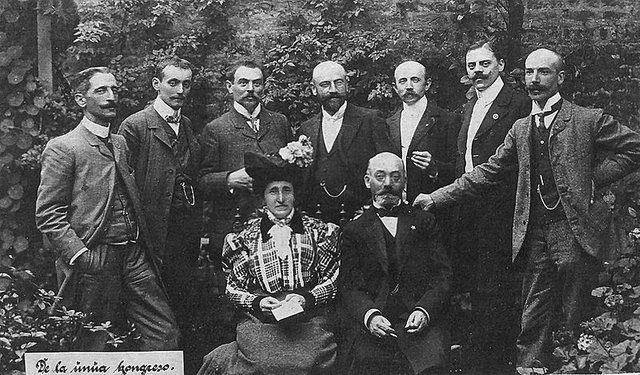
The Esperanto founder and other esperantists, at the first UK (Universal Esperanto Congress) | source
My friend then gave me the typical information that always appears in the Esperanto propaganda: this is the easiest language, which one can learn very quickly and which allows us to speak directly with any foreigner, not requiring to understand his national language (or he to understand ours) and, in addition... this language seeks to achieve peace among the diverse peoples on Earth.
All this inevitably seemed interesting to lively young people who have not yet built their destinies; young people spontaneously attentive to any brilliant opportunity of life, because they seek to capture the proper qualities to shape their own personalities. These motivations are, of course, subconscious, but they strongly propel our young minds along the direction of the lifestyles, decisions and experiences that will shape our individual destinies.
My friend's enthusiasm had a short life, and in hindsight I can understand why: A young man, whether urban or rural, in order to choose a path and devote himself to it, needs motives naturally connected to the interests of his age and his living conditions. Young people need that any proposal presented brings the promise of experiences that they, at their age, may consider worthy of their personal efforts.
Of course, our psychic and cultural diversity modifies to some degree the expression of that need; sometimes to a high degree. That explains why young people in certain societies —where culture is highly appreciated— are more interested in this type of subject. And it also explains why my enthusiasm for Esperanto survived with great strength and even intensified, after a few years, building entirely my own identity and personality.
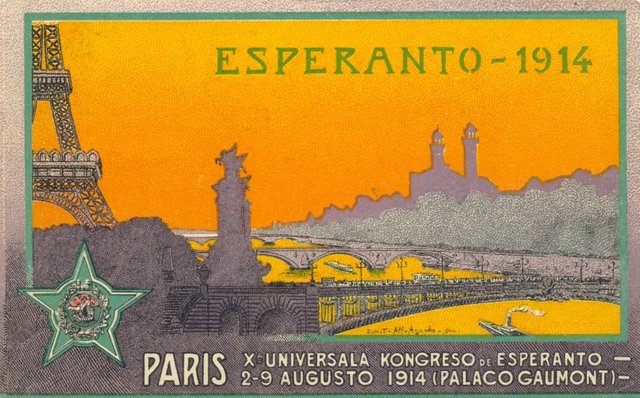
Postcard of a UK at Paris | source
In that small room I heard the first Esperanto phrases of my whole life. The brief idealistic description along with the beautiful sound of that language were the only ingredients my soul needed to decide —albeit unconsciously— that this was an adequate reality for my future existence. My young mind already possessed a strong interest for the higher contemplations of the human life. For that reason Doctor Esperanto (pseudonym of that language creator) made his way easily and secured his place in my spirit.
I know many Esperanto-speakers from all over the world, and by their testimonies I can understand that my experience is not infrequent. On the contrary, it represents the fundamental impression that the Esperanto proposal exerts on people, regardless of their cultural origins. This should be a striking observation, at least for those who are accustomed to reflecting on the profound meaning of social issues.
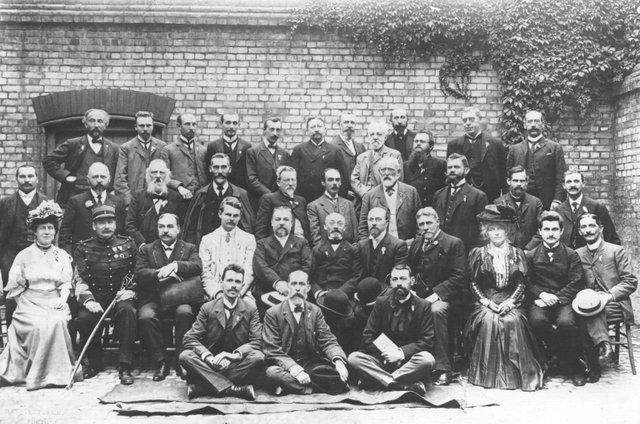
Language Comittee of the third UK, England 1907 | source
The world of Esperanto is filled with messages concerning this somewhat defined ideal of fraternity, mutual understanding and humanitarian collaboration. This ideal is clearly expressed in the anthem of the language —yes, a language with an anthem... that is already quite revealing— and reflected in that nebulous package of moral values that Esperantists usually manifest at their encounters. It is almost impossible to look anywhere in Esperantio (the name given to the international Esperanto diaspora) without encountering these frequent messages from the ideal of Zamenhof, the father of the language.
However, in spite of the omnipresence of such messages —which always go beyond the mere linguistic matter, and address issues of greater transcendence in the world— they do not seem to possess sufficient power to create a community that effectively embodies the lofty universalistic senses contained in those ideals, thus shaping another type of culture: an autonomous and never seen culture, a demonstration of the true overriding out of those mental and cultural chains that were so criticized by the creator of Esperanto: dogmatism, fanaticism, intolerance and so on...
This is not a minor problem. It manifests itself in the entire Esperanto movement —regardless of whether its members ignore it— mutilating its possibilities and stopping the possible development of better conditions for the community. In other words: This is an essential problem whose roots lie at the grassroots, the conceptual basis of the Esperanto movement.
Yet which is the root of this obstacle? I maintain that it lies in the very historical genesis of the Esperanto community: right at the moment of the public launch of the project. This is something that can be explained briefly:
The true, integral project of the founder of Esperanto was, in fact, a cultural and philosophical project —which widely clarifies the idealistic character of the current movement—. It was an essentialist perspective about the world and the best behavior of the human being. That project was called humanitism (homaranismo in Esperanto)... and the international language Esperanto was only to be its subordinate instrument.
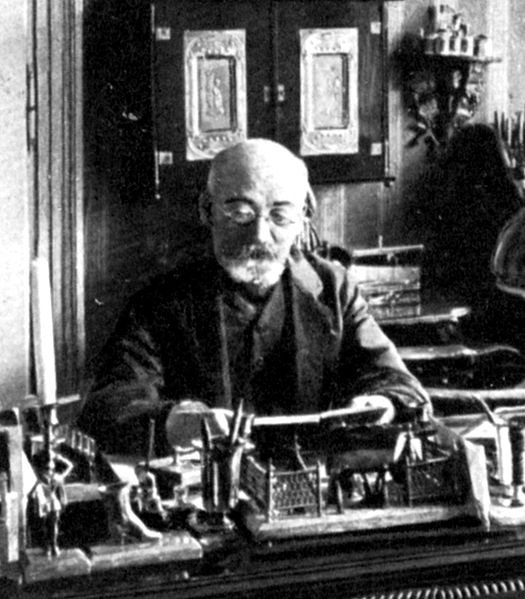
Zamenhof at his workplace | source
This inspiration gave rise to such a resistant Esperanto ideal that, even today, it is constantly discovered in every Esperanto circle. This is why it happens all too often that Esperantists speak as if they were some kind of religion, or as passionate activists of some social movement, whose ambitions are not merely linguistic.
However, that ideal was crippled at birth. Historically, strong social pressures forced the Teacher to no longer promote his philosophical and cultural interests (the humanitism) in the growing community. Dr. Zamenhof, prioritizing the will of community, surrendered to such restraining demands.
Don't insist too much on ethical principles, sir... our business is just a language.
But humanitism was the thriving heart of the whole affair; from it arose the ideal essence that inspired —albeit invisibly— so many men to travel to the First Esperanto Congress held in Boulogne-sur-Mer. Both then and today, humanitism is the feeling that surprises so many people, and cultivates in them an indefinite desire to participate in the Esperanto movement.
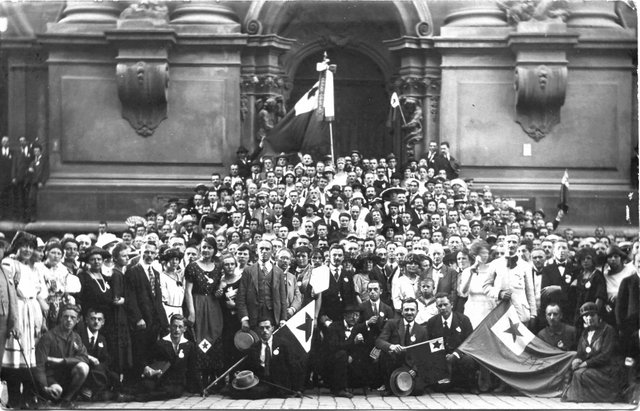
13th UK, Prague, 1921 | source
Thus the heart of the whole affair was reduced, even before it was born —for a variety of complex reasons that I will explain in next publications—. From a great philosophical-cultural proposal it became just a tiny and beautiful ideal that today is simply called the inner idea of Esperanto. But from this emerged a plethora of contradictions, because today many Esperanto-speakers believe themselves to be —due to the inner idea— participants of a social initiative with universalistic cosmovisions, immensely relevant for the whole humanity; but yet no other dynamic is allowed, at all, than that of a mere language fan club... a club full of deluded people.
Of course, there is nothing reprehensible about a linguistic movement that only seeks to spread a somewhat useful means of communication. This is an objective that is held by other movements alike (and all of them are worthy of interest). But, obviously, the potential of such initiatives are limited to the mere act of communication. That has nothing to contribute to a transcendent development of another culture... one that could heal the diseases of our societies, as Zamenhof wanted.
In spite of everything, it is not yet suspected the surprising power that possesses that seed called inner idea. Time and again, the desire of many Esperantists to address directly the humanitist dream explodes and shines.
A few years ago, Mark Fettes (at that time, President of the Universal Esperanto Association) relaunched Helmut Welger's proposal that we should think of Esperantism not as a mere language with an internal idea, but on the contrary: an idea that possesses an internal language. Thus Fettes recovered the silent vocation of Zamenhof, who in his time was forced to publicly express the opposite of his own ideal.
Personally, from the Esperanto affair only interests me that possibility. That is why I have been preparing for many years, and with a great deal of personal sacrifice, some projects that could help in this important development. I am trying to relaunch now my project Radio Stelo, through which I will be permanently sharing reflections on this topic.
If you also feel interest in the possibility of a humanitist esperantism, follow me and remain attentive to the virtual spaces of my renewed initiative, Radio Stelo... for a humanitist perspective with an inner language.
Youtube RS | Bittube RS
Twitter RS | Facebook RS


You can share my writings on your social networks and websites; but be so kind as to inform my authorship, as well as the source of the text with a link to my blog.
~Spirajn Senpretend~
Website
Patreon
BitBacker
Steemit
Weku
Busy
DTube
Facebook SS
Twitter SS
[email protected]
If you want to support my work but this post got beyond 7 days old, please go to my most recent publication, so that your upvote could really reward my efforts. You can also send a little tip to my wallet.
In any case, I will be very grateful for your kind support.
Hi spirajn,
Visit curiesteem.com or join the Curie Discord community to learn more.
Many thanks @curie, for your strong support.
This is a very interesting post. I have heard about esperanto many years ago but I thought it was a dead language and I didn't know that there was so much behind.
How long did it take you to learn this language? Also, I guess that the radio will be in esperanto, right?
Thank you for sharing and have a lovely day!
Thank you, @delishtreats. It's good to see how people get interested in this issue when it's explained with some deepness.
Well I studied Esperanto everyday during some weeks... perhaps one month, and then I found that I really could express myself very easily in that language. To test it, I searched some open chats and began to speak with other esperantists online. I found that my level was enough to communicate fluently with everyone, at least by text (it took 4 or 5 months from that to speak it well enough, by voice).
Of course, that's just the basic stage. We keep learning and perfecting our skills in every language forever. But if someone just wants to create interesting connections throughout the world, Esperanto becomes a great easy tool for that, after some weeks (it's really a very fast progression).
Well, Radio Stelo is not exactly a radio. It's more of a periodic podcast with video editing at some platforms like Youtube. It will be mostly in Esperanto but every video will have subtitles to English and Spanish, because those are always my main targets.
It's a lot of work... but I desire to further and sustain it, because t's an important part of my philosophical and cultural work. I have suffered terrible consequences from nationalism and other political, social and religious dogmas, with all their separatist fanaticism... all their stupidity. I guess that's the reason why the motives of Zamenhof seem so important to me.
My best wishes for you too.
It's interesting to read how fast you were able to learn a language. I might go deeper into this as I'm curious about the words and grammar. I assume that the grammar is quite easy as otherwise it would take longer to practice. 4-5 months to speaking sounds very short too. Congratulations!
Do you know how big is the community speaking Esperanto?
I understand now. I can imagine that it will be a lot of work with that podcast as you want to do it in 3 languages. But if it makes you happy then you will enjoy the process :)
Sorry for the late answer. Sometimes I enter into the dark ages through a time machine, and later I come back.
Oh yes, it is a very easy grammar, created in a way that helps memorization: every substantive ends with o, every adjective with a, every adverb with e and so on, without exceptions.
Well, the issue of the number of speakers is one of the unsolved difficulties in the community. Most Esperanto-speakers are not part of any Esperanto organization, so the calculations differ widely. But the official number (of well-known speakers) is around 2 million esperantists.
Thanks for being so kind. !tip
🎁 Hi @delishtreats! You have received 0.1 STEEM tip from @spirajn!
@spirajn wrote lately about: The Activists' Anxiety... A Big Mistake Feel free to follow @spirajn if you like it :)
Sending tips with @tipU - how to guide.
Cheers @spirajn
I hook your article in the first lines.
Good approach to a topic totally unknown to me but interesting in its purposes and how the system has been leading it.
You have motivated me to investigate more about it.
I'm glad to know that like me you are from Venezuela.
I will be attentive to your publications for what your follower will do to me and I will give reSteem to have your publication at hand.
Enjoy your vote Curie!
Happy life.
Hello! It's amazing to see how many Venezuelans participate here.
I thank you immensely for your support. Our lives are very difficult but the help of people like you makes it far more easy and beautiful.
Oh, you are a curator from Curie! That's great. I think this was maybe the first upvote I received from Curie. It gave me more enthusiasm.
Thanks for your answer.
I'm not a Curie curator but I participate in the Curie comment contest.
You can do it too, follow the instructions in Curie.
You have to comment on the publications that Curie comments and weekly you will be rewarded with Steem.
Oh thank you for this information, and sorry for the late response. I hope I could take advantage of those contests. !tip
🎁 Hi @mariita52! You have received 0.1 STEEM tip from @spirajn!
@spirajn wrote lately about: The Power Of Resilience (English Subtitles) Feel free to follow @spirajn if you like it :)
Sending tips with @tipU - how to guide.
Oh, thank you!
I will be honest, I had never heard of this topic at 19 but it is very interesting to read good content and with good arguments, I give you my congratulations and greetings from Venezuela :)x
Thank you @iamsaray, It's nice that my work is meaningful to you.
I'm also from Venezuela. Now I'm taking a walk at your blog and I found your little cute ghost Pepe. I like it. It's a lot of work!
I hope you will keep on that project and develop it in the best way. I'm also a filmmaker and I know the love and the effort we put on all our creations.
However it was difficult to look the video at Dtube because it is hosted by the IPFS (the load is heavy, and more in Vzla, with our poor connectivity). Have you considered to use the new Dtube feature, to simply put the link from Youtube to upload it in Dtube (not using the IPFS)?
Entonces puedes hablar en español? No sabía que tambien eras de Venezuela! Obviamente sé hablar dos idiomas pero he perdido la práctica con el Inglés, respecto a lo último, fue mi primera vez colocando un video en Dtube y la verdad sigo sin entender mucho... Crees que puedes explicarme?
Sí, querida. No es problema. Si fuese demasiado complejo debería explicarte en Discord, pero en verdad es sencillito:
Yo aproveché esa nueva característica hace poco cuando subí mi primer video, y me encantó. Sólo necesitas cliquear en Upload y, en vez de subir el video, colocas el link de tu video de Youtube (o de alguna otra plataforma) allí en el primer campo.
Cliqueas el botón de subir y te toca escribir los detalles, la descripción del video y todo eso.
Una cosa importante que debes saber: cuando publicas el video, estando "logueada" en Steemit (así como en mi imagen, arriba a la izquierda, aparece que ingresé en ambas plataformas) lo que publiques en la descripción del video, se publicará en Steemit como un post.
Pero luego, cuando vas a Steemit y editas eso para agregarle cosas o ponerlo más bonito... esa edición no se realizará en la descripción de tu video en Dtube. Es unidireccional: lo que se publica en Dtube aparece en Steemit, pero lo que se publica en Steemit no aparece en Dtube.
Me gustaría ver los nuevos episodios de tu fantasma. Estaré atento a tus nuevas publicaciones.
Muchas gracias! De verdad no tenía mucha idea de las funciones de Dtube, te agradezco la ayuda♡
Hi @spirajn. I am truly surprised with this post. I think I had never seen the Humanist Esperanto as you call it. Yes I had heard of Esperanto but, excuse me, it seemed like a group of fans who always have to be right because they don't leave you alone. I loved your post. Very professional, well written, well narrated. Thank you for this beautiful literary essay.
Thank you, dear @marcybetancourt, for your appreciation and words.
I understand your impression completely. Those weird attitudes were exactly the things I tried to change some years ago when I joined the directorate of the Esperanto Association in my country, Venezuela.
I strove so hard to impulse some cultural initiatives that could guide the Esperanto activists along a better and wiser way. But I had to resign my efforts because the traditional movement don't want to hear about its problems.
Your right. It's a toxic pride and self-referentiality that shows they are not willing to look at the world's problems and needs. They only want to be seen and they don't want to see. That makes them annoying and highly deluded people.
But, as I said, that's not the heart of Esperanto; that's only its sickness. I hope that you'll get to see, soon, the real beautiful heart of the humanitist movement.
Congratulations @spirajn! You have completed the following achievement on the Steem blockchain and have been rewarded with new badge(s) :
You can view your badges on your Steem Board and compare to others on the Steem Ranking
If you no longer want to receive notifications, reply to this comment with the word
STOPVote for @Steemitboard as a witness to get one more award and increased upvotes!